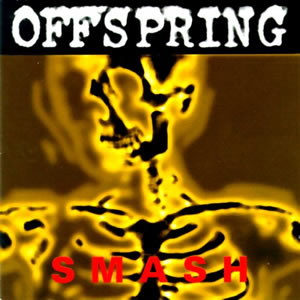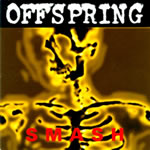Smash by The Offspring
 Often overlooked by their more lauded West Coast contemporaries, The Offspring were nonetheless a hard rock powerhouse in the mid to late nineties. Their aptly named breakthrough album, Smash, achieved platinum sales and reached the Top 10 in over a dozen countries, peaking at #4 on the US album charts. Unlike the group’s first two releases, which were close to hardcore punk in genre, this third independent album leans more towards the emerging grunge rock and pop punk sound, which brought the critical and commercial success. In total, Smash has sold over 20 million copies worldwide, making it the best-selling independent label album of all time.
Often overlooked by their more lauded West Coast contemporaries, The Offspring were nonetheless a hard rock powerhouse in the mid to late nineties. Their aptly named breakthrough album, Smash, achieved platinum sales and reached the Top 10 in over a dozen countries, peaking at #4 on the US album charts. Unlike the group’s first two releases, which were close to hardcore punk in genre, this third independent album leans more towards the emerging grunge rock and pop punk sound, which brought the critical and commercial success. In total, Smash has sold over 20 million copies worldwide, making it the best-selling independent label album of all time.
The Offspring began in Southern California in the mid 1980s with guitarist, lyricist, and front man Bryan “Dexter” Holland and bassist Greg Kriesel. Later on the group added Ron Welty and guitarist Kevin Wasserman to round out the quartet. In 1989, the group recorded their first album with producer Thom Wilson, who continued to work with the group on their 1991 sophomore effort and on Smash.
However, when they began studio work on this album in 1993, the band’s relations with Wilson had begun to strain. Still, the team worked well enough together to forge a successful sound which became highly influential over the coming decades and still resonates with listeners to this day.
 Smash by The Offspring |
|
|---|---|
| Released: April 8, 1994 (Epitath) Produced by: Thom Wilson Recorded: Track Record, North Hollywood, CA, October–December 1993 |
|
| Track Listing | Group Musicians |
| Time to Relax Nitro (Youth Energy) Bad Habit Gotta Get Away Genocide Something to Believe In Come Out and Play Self Esteem It’ll Be a Long Time Killboy Powerhead What Happened to You? So Alone Not the One Smash |
Dexter Holland – Lead Vocals, Guitars Kevin Wasserman – Guitars, Vocals Greg Kriesel – Bass, Vocals Ron Welty – Drums, Vocals |
Aside from the single cover song, Holland composed all songs on Smash, which includes a spoken-word narrator who makes three appearances, starting with the 25 second intro “Time to Relax”. Welty’s relentless drums drive the track “Nitro (Youth Energy)”, with dueling vocals and guitars buried quite a bit back in the mix and a constant refrain of “living like there’s no tomorrow”. “Bad Habit” takes a different approach as Kriesel’s slow, accented bass riff dominates the intro and first verse before the second verse brings additional punk structure and drive. Later there is a naked vocal middle section laced with profanity, which may actually be the overall most creative and interesting part of the song.
“Gotta Get Away” starts with a drum roll and bass intro, reminiscent of a 1960s pop beat, before the song morphs into a more hard rock oriented arrangement which seems to be heavily influenced by Nirvana. Released as a single, the song reached number 6 on the Modern Rock chart. “Genocide” is mainly structured more like a heavy metal track with distorted riffs and double-kick drums but the vocals keep it grounded within the pop/punk realm. Overall not a bad tune, just thick and slow in the melody hooks. “Something to Believe In” is an honest attempt at 70s-style punk, before it later dissolves to a bass driven bridge.
The song this band was born to play, “Come Out and Play”, with an anthemic, shout-along chorus, was the catalyst that brought the Offspring great success. Although not officially released as a single, the song hit the airwaves and raced to the top of the Mainstream Rock charts. Fueled by Holland’s Eastern-style riff, lyrics on adolescence, and an entertaining stop-start arrangement, the song struck a unique chord in the rock music universe. The second most popular song on the album, “Self Esteem” is a fun song with great, pathetic, philosophical, and almost comical lyrics about an unhealthy relationship. Beginning with full arrangement, the song leans on strong bass and deadened guitars during the verses and a fuller arrangement elsewhere as the truth of its lyric puts it over the top;
“the more you suffer, the more it shows you really care…”
Later in the album, the material thins out a bit. “It’ll Be a Long Time” sounds like a fast-paced Black Sabbath song, more worried about the riff and the jam than the noise and attitude of punk. “Killboy Powerhead” is the a cover by contemporary punk group The Didjits with a cool, Saturday morning cartoon vibe. “What Happened to You?” is a very short but entertaining excursion into ska where the performance and production is tighter than anywhere else on the album, while “So Alone” is pure filler of 100mph punk that lasts barely 70 seconds in total duration. “Not the One” is where surf music meets punk, setting up the closer “Smash”, which almost sounds like a pimped-out, punked-out version on the previous track. This final song does pick up a bit in intensity before abruptly ending with “closing comments” by a narrator.
The unprecedented success of Smash garnered attention from major labels like Columbia Records, with whom The Offspring signed in 1996. The following year, the group released their much anticipated follow-up Ixnay on the Hombre, which continued to elevate the group’s success.
~
Part of Classic Rock Review’s celebration of 1994 albums.





